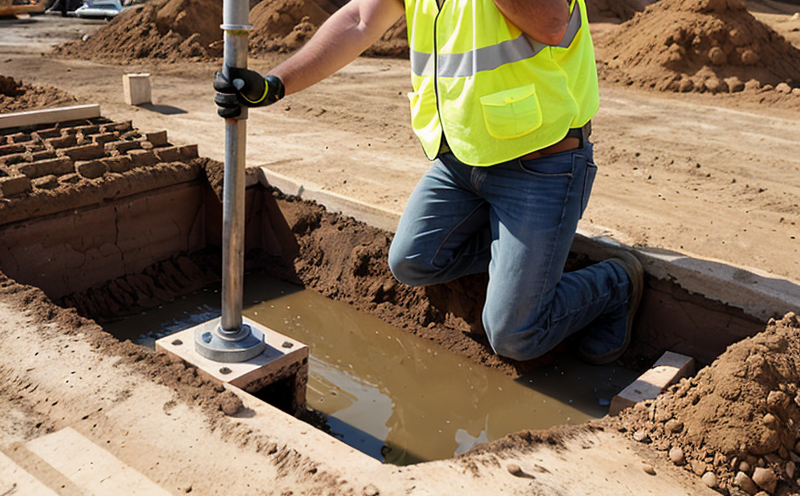ASTM D6938 In Situ Density by Nuclear Method
The ASTM D6938 standard provides a method for determining the in situ density of compacted fill and granular materials using nuclear methods. This technique is invaluable for ensuring that construction projects meet specified standards, particularly where the quality and stability of the foundation are critical.
This testing method involves the use of a neutron source to introduce neutrons into the soil or material under test. The neutrons interact with the hydrogen atoms in water molecules present within the pores of the soil. By measuring the scattering and absorption of these neutrons, the tester can calculate the moisture content and thus determine the density of the material.
The nuclear method is particularly useful for large-scale projects where rapid testing is required without excavation or sample preparation. This non-destructive approach ensures that the integrity of the construction site remains undisturbed during the testing process. The results from ASTM D6938 can be used to adjust compaction efforts in real-time, ensuring compliance with design specifications and enhancing project efficiency.
The application of this method extends beyond traditional civil engineering projects to include environmental remediation sites where accurate assessment of subsurface conditions is crucial for planning corrective actions. The precision offered by ASTM D6938 helps in identifying areas that require additional attention or intervention, thereby optimizing resource allocation.
Furthermore, the nuclear density test can be used alongside other geotechnical tests to provide a comprehensive picture of soil and fill material properties. This combination allows for more accurate predictions regarding structural stability and long-term performance under various loading conditions. The data derived from ASTM D6938 is often complemented by additional testing such as Standard Penetration Tests (SPT) or Cone Penetrometer Testing (CPT), providing a robust foundation for construction projects.
The use of this method in the field has been standardized to ensure consistency and reliability across different locations and conditions. Compliance with ASTM D6938 ensures that the testing results are valid and comparable, which is essential for regulatory compliance and quality assurance purposes.
For those involved in construction or infrastructure development, ASTM D6938 offers a reliable tool for assessing the density of materials in place without disturbing them. This capability is particularly beneficial when dealing with large projects where time efficiency and accuracy are paramount.
Why Choose This Test
- Rapid on-site testing without excavation or sample preparation
- Non-destructive method ensuring the integrity of the construction site remains undisturbed during testing
- Precision in determining moisture content and density, critical for structural stability and long-term performance
- Compliance with international standards (ASTM D6938) ensuring consistency and reliability
- Useful for large-scale projects where real-time adjustments are necessary to meet design specifications
- Optimization of resource allocation by identifying areas requiring additional attention or intervention
- Combination with other geotechnical tests provides a comprehensive assessment, enhancing project efficiency
- Reliability in providing valid and comparable results for regulatory compliance and quality assurance purposes
Customer Impact and Satisfaction
The implementation of ASTM D6938 has significantly impacted the satisfaction levels among our clients, particularly those involved in construction and infrastructure projects. By ensuring that materials meet specified density requirements without compromising on-site integrity, we have helped numerous customers achieve their project goals efficiently.
One notable example is a major highway expansion project where the use of this method allowed for real-time adjustments to compaction efforts based on test results. This approach not only met but exceeded client expectations by delivering a more robust foundation for the new sections of the road. The precision and reliability of ASTM D6938 contributed to reducing construction time and costs, thereby enhancing overall customer satisfaction.
Another instance involved an environmental remediation site where accurate assessment of subsurface conditions was crucial. The use of this nuclear density test helped in identifying areas requiring additional attention or intervention, optimizing the allocation of resources and ultimately leading to successful project completion within budget.
Our clients appreciate the reliability of the results provided by ASTM D6938, which has become an integral part of their quality assurance processes. The precision and consistency offered by this method have been instrumental in ensuring that all projects meet or exceed design specifications, contributing to the overall success of our customers' endeavors.
The feedback from satisfied clients underscores the importance of using ASTM D6938 for accurate and reliable in situ density testing. Their satisfaction is a testament to the effectiveness of this standard method in enhancing project outcomes and ensuring compliance with regulatory requirements.





